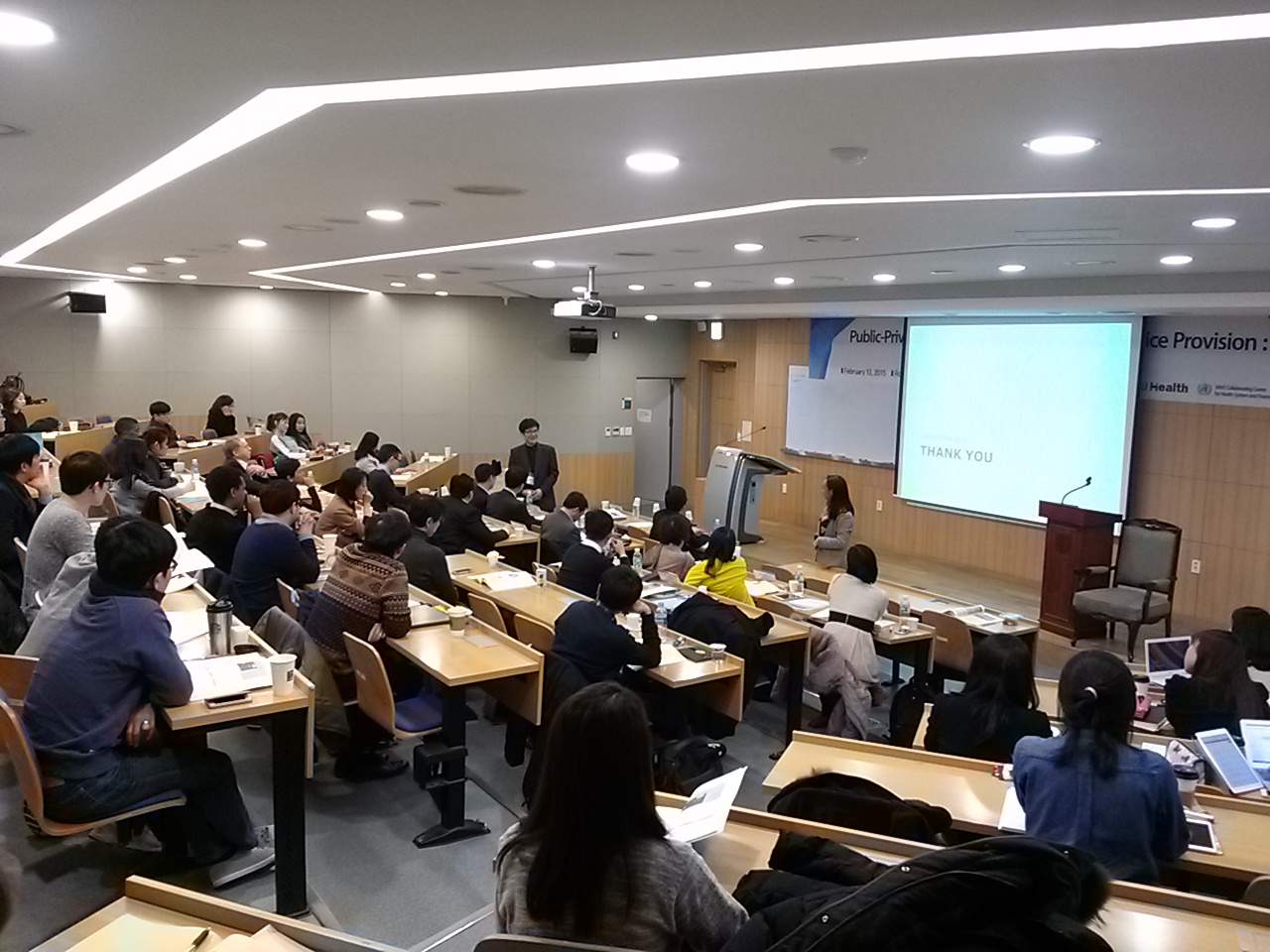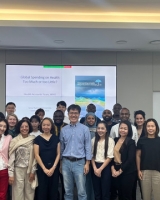


2015.02.23 17:08
Public-Private Partnership (PPP) in Health Service Provision: Regulation and Financial Incentives - Symposium & Experts' Meeting (12-13 Feb 2015)
Views 44508 Votes 0 Comment 0


The WHOCC for Health System and Financing (Director: Soonman Kwon) once again led discussions among experts, this time about issues concerning Public-Private Partnership (PPP) in Health. The two-day (12-13 Feb) activity included a public seminar where students from Seoul National University and guests attended. Presentations from experts from different countries provided information about their current initiatives on PPP and reflections on the strategy. Themes emerged from the discussions include the need to identify the implicit / explicit motivation of each countries’ PPP initiatives, emphasis on the importance of accountability and the issues of transparency in contracting with private providers. There was also an overall consensus for the need for more evidence to show if PPP really works or not in a health system.
The second day of the activity paved way for a more in-depth discussion on PPP in the perspective of regulation and financial incentives. Discussions on (1) Government responsibility and overall health system architecture; (2) Regulation and legislation and enforcement appliance; (3) Financial incentives and the role of health insurance were led by each facilitator and the way forward on PPP was also discussed.
Summarizing from the outcomes of the in-depth discussions on PPP, there was a strong agreement that government should institute regulatory and legislative support for PPP. Highlight was the experience of East Asian countries where services provided in the private sector are included in the countries’ benefit packages. Context was also recognized important because of the varying involvement of the private sector in the health system, with East Asian countries having more private providers than other transitional Asian countries hence, difference in the degree of private provider participation. PPP in health as used by many countries, should be further understood as of its importance to health systems, justifying the need for this policy tool for better health and health systems planning and implementation.
ㅁ Lists of participants:
- Soonman Kwon (WHOCC-HSF, School of Public Health, Seoul National University)
- Tae-jin Lee (School of Public Health, Seoul National University)
- Myoungsoon You (School of Public Health, Seoul National University)
- Juhwan Oh (School of Medicines, Seoul National University)
- Gabriel Leung (School of Medicine, University of Hong Kong)
- Yingyao Chen (School of Public Health, Fudan University)
- John Langenbrunner (AusAID, Australia Department of Foreign Affairs and Trade)
- Khuong Anh Tuan (Health Strategy and Policy Institute, Vietnam)
- Soulivanh Pholsena (Department of Medical Care, MOH Lao PDR)
- Lo Veasna Kiry (Dept of Planning and Health Information, MoH Cambodia)
- Baorong Yu (WHO China)
- Henrik Axelson (WHO Cambodia)
- Valeria de Oliveira Cruz (WHO Lao PDR)
- Phuong Nguyen (WHO Viet Nam)
- Ke Xu (WHO WPRO)
- Annie Chu (WHO WPRO)
- Vivian Lin (WHO WPRO)
- Clive Tan (WHO WPRO)
- Ngan Do Kim (WHO WPRO)
- Eunkyoung Kim (WHO WPRO)
-
Read More

2023 WHO Seminar on Health System and Financing
WHO Seminar 2023 on Health System and
Financing was held at the WHO Collaborating Centre for Health System and
Financing at the School of Public Health, Seoul National University, Korea on 1
September 2023.
Starting with opening...Date2023.09.03 Byadmin Views1494 -
Read More

The 7th Meeting of the Asia-Pacific Network on Access to Medicines under Universal Health Coverage (New Delhi, India, 13-14 June 2023)
The Seventh Meeting of the Asia-Pacific
Network on Access to Medicines under Universal Health Coverage was held at the
Leela Palace in New Delhi, India from 13 to 14 June 2023.
Starting with a keynote presentation by
Prof. Soo...Date2023.07.17 Byadmin Views1720 -
Read MoreNo Image
WHO Asia Pacific Observatory (APO) write shop, Bangkok, Thailand (9 to 10 February 2023)
WHO Asia Pacific Observatory (APO) write shop on updating the APO health system review template was held in Bangkok, Thailand from 9 to 10 February 2023.
The APO health system review is a series of reports published by the WHO,...Date2023.02.14 Byadmin Views19206 -
Read More

The 6th meeting on Access to Medicines under Universal Health Coverage in the Asia Pacific Region. Taking stock of lessons learned and moving forward. (24-25 Sep 2019)
The 6th meeting on Access to
Medicines under Universal Health Coverage in the Asia Pacific Region was held
in Manila, Philippines from 24 to 25 September 2019.
Specific objectives of the meeting were:
1.
To sh...Date2020.02.27 Byadmin Views9788 -
Read More

Workshop on “Designing financial protection policies” (10-12 September 2019)
World Health Organization
(WHO) Collaborating Centre for Health System
and Financing has participated in a workshop on “Designing financial protection
policies” held in Manila, Philippines on 10-12 September 2019.
Specific...Date2020.02.27 Byadmin Views163259 -
Read More

International Seminar on Health Financing, SNU, Korea (29 Mar 2019)
World Health Organization (WHO) Collaborating Centre for Health System and Financing held a seminar on “International Seminar on Health Financing” in School of Public Health, Seoul National University, Seoul, Republic of Kore...Date2019.05.16 Byadmin Views19153 -
Read More

The 5th meeting on Access to Medicines under Universal Health Coverage in the Asia Pacific Region, New Delhi, India (19-20 Sep 2018)
The 5th meeting on Access to Medicines under Universal Health Coverage in the Asia Pacific Region was held in New Delhi, India from 19 to 20 September 2018. The meeting was organized by the Organization for Economic Co-operation a...Date2018.10.22 Byadmin Views25836 -
Read More

Health Care Financing for Universal Health Coverage: Key Issues and Challenges, SNU, Korea (27 Apr 2018)
World Health Organization (WHO) Collaborating Centre for Health System and Financing held a seminar on “Health Care Financing for Universal Health Coverage (UHC): Key Issues and Challenges” in School of Public Health, S...Date2018.04.30 Byadmin Views92484 -
Read MoreNo Image
The 68th Regional Committee Meeting of the WHO Western Pacific Region (9-13 Oct 2017)
Prof Soonman Kwon, Director of World Health Organization (WHO) Collaborating Centre for Health System and Financing, was invited to attend the sixty eighth Regional Committee Meeting (RCM) of the WHO Western Pacific Region (WPR) in Brisbane,...Date2017.10.16 Byadmin Views69599 -
Read More

The 4th meeting on Access to Medicines under Universal Health Coverage in the Asia Pacific Region (26-27 Sep 2017)
The 4th meeting on Access to Medicines under Universal Health Coverage in the Asia Pacific Region was held in Seoul, Republic of Korea from 26 to 27 September 2017. The meeting was organized by the Organization for Economic Co-operation...Date2017.09.30 Byadmin Views21767 -
Read MoreNo Image
The 70th Regional Committee Meeting of WHO South-East Asia Region (6-10 Sep 2017)
Prof Soonman Kwon, Director of World Health Organization (WHO) Collaborating Centre for Health System and Financing, was invited to attend the Seventieth Regional Committee Meeting (RCM) of WHO South-East Asia Region (SEAR), the annual meeti...Date2017.09.11 Byadmin Views5238 -
Read More

The 3rd meeting on Access to Medicines under Universal Health Coverage in the Asia Pacific Region (22-23 Sep 2016)
The 3rd meeting on Access to Medicines under Universal Health Coverage in the Asia Pacific Region was held in Seoul, Republic of Korea from 22 to 23 September 2016. The meeting was organized by the Organization for Economic Co-ope...Date2016.09.29 Byadmin Views17425 -
Read More

KSP-ADB-SNU Conference on Universal Health Coverage (27 Nov 2015)
The WHOCC for Health System and Financing (Director: Prof. Soonman Kwon) and Graduate School of Public Health, Seoul National University lead discussions on Universal Health Coverage (UHC). This time, focusing on Vietnam, ...Date2015.12.09 Byadmin Views14336 -
Read More

The 2nd Meeting on Access to Medicines under Universal Health Coverage in the Asia Pacific Region (17-18 Sep 2015)
The Organization for Economic Co-operation and Development (OECD) Korea Policy Centre, World Health Organization Western Pacific Region (WPRO), OECD, and World Health Organization Collaborating Centre for Health Syste...Date2015.09.24 Byadmin Views13885 -
Read More

Public-Private Partnership (PPP) in Health Service Provision: Regulation and Financial Incentives - Symposium & Experts' Meeting (12-13 Feb 2015)
The WHOCC for Health System and Financing (Director: Soonman Kwon) once again led discussions among experts, this time about issues concerning Public-Private Partnership (PPP) in Health. The two-day (12-13 Feb) activity includ...Date2015.02.23 Byadmin Views44508 -
Read More

Experience of Health Insurance in Africa and Asia (26 Nov 2014)
The Graduate School of Public Health of Seoul National University and the WHO Collaborating Centre of Health System and Financing hosted a seminar exploring the health financing experience of Cambodia, Ethiopia and Ghana. Expert...Date2014.11.27 Byadmin Views9718 -
Read More

The 1st Meeting on Access to Medicines under Universal Health Coverage in the Asia Pacific Region (18-19 Sep 2014)
The Organization for Economic Co-operation and Development (OECD) - Korea Policy Centre, World Health Organization Western Pacific Region (WPRO), and World Health Organization Collaborating Centre for Health Systems...Date2014.10.08 Byadmin Views8739 -
Read More

APO Internal Working Group Meeting (11-12 Aug 2014)
The Asia Pacific Observatory on Health Systems and Policy (APO) of WHO Western Pacific Regional Office (WHO-WPRO) together with WHO Collaborating Centre for Health Systems and Financing (WHOCC-HSF) conducted...Date2014.09.16 Byadmin Views8632 -
Read More

Launching of GSPH as WHOCC for Health System and Financing (10 April 2014)
The Graduate School of Public Health (GSPH) of Seoul National University celebrates being designated as a WHO Collaborating Center for Health Systems and Financing (WHOCC-HSF). The center director, Prof. Soonman...Date2014.06.30 Byadmin Views9154 -
Read More

Health Financing Experts' Meeting (8-9 April 2014)
The Graduate School of Public Health of Seoul National University was recently designated as a World Health Organization Collaborating Centre (WHOCC) for Health Systems and Financing. Lead by its direc...Date2014.06.30 Byadmin Views18124
Designed by sketchbooks.co.kr / sketchbook5 board skin
Sketchbook5, 스케치북5
Sketchbook5, 스케치북5
Sketchbook5, 스케치북5
Sketchbook5, 스케치북5






